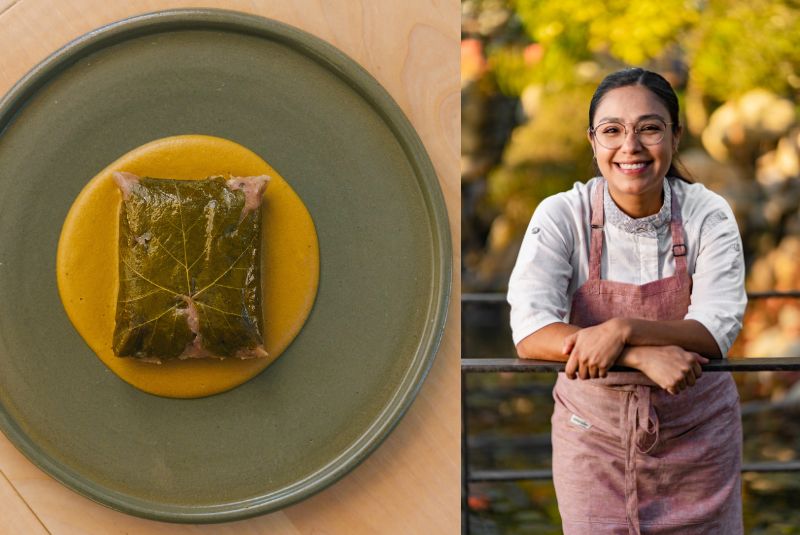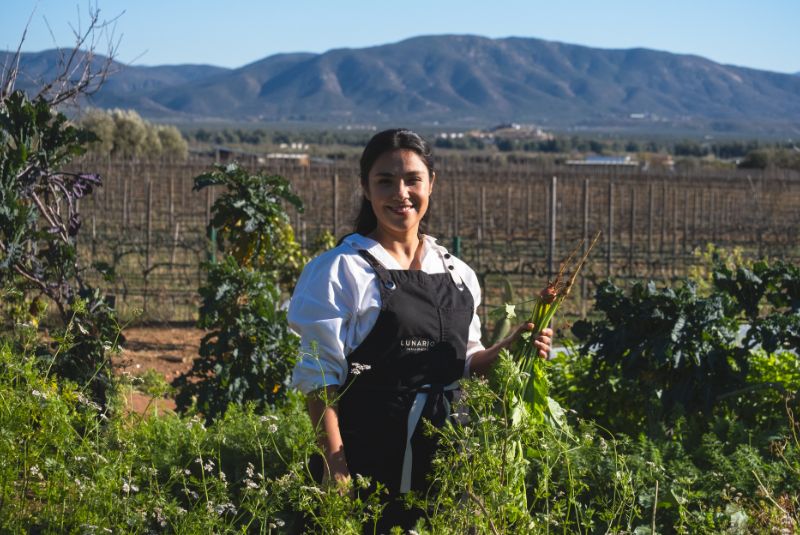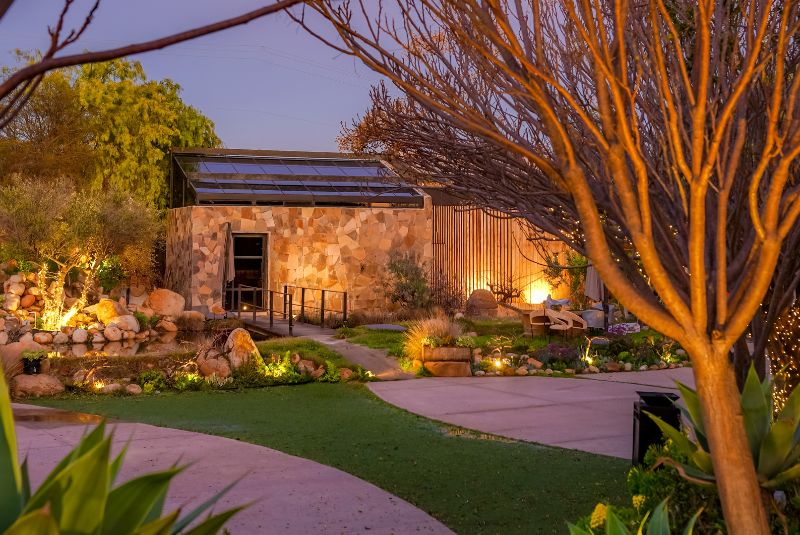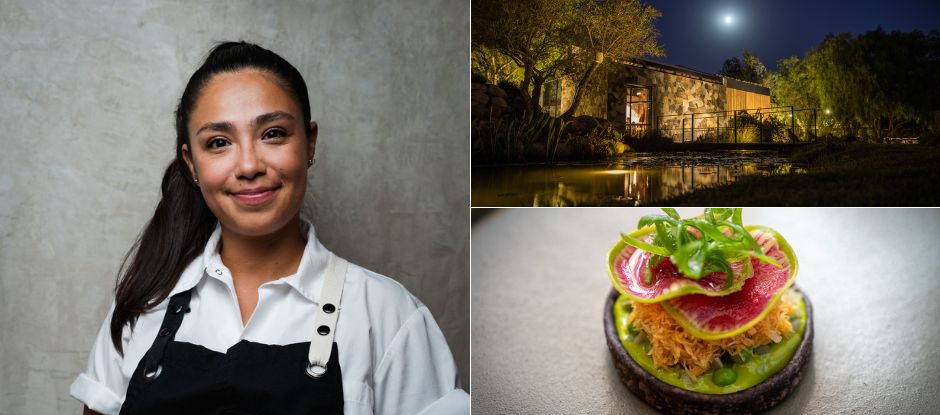Located close to the coastal city of Ensenada in Mexico, Lunario is the winner of the Sustainable Restaurant Award at Latin America’s 50 Best Restaurants 2024. Chef Sheyla Alvarado reveals the motivations and challenges of running a fine dining spot that is kind to the planet
For Sheyla Alvarado, creating the most sustainable restaurant possible was never a goal per se, it was more of an inevitability. In the remote, agricultural Valle de Guadalupe in Mexico’s north-westernmost state of Baja California, all you see is the land – yes, there are wineries, ranches and restaurants dotted around the valley, but the views of the mountains and landscape go on for miles, and the dominating feeling is of being surrounded by nature.
“Being situated in an agricultural area, it’s impossible to ignore nature and the effects of climate change,” says the chef, who grew up in Sonora, a vast state separated from the Baja California peninsula by the Gulf of California.
Lunario takes control of sourcing and traceability by working with its sister farm, Finca La Carrodilla, which produces 90 per cent of the vegetables for its six and eight-course, plant-forward, seasonal tasting menus. Dairy, meat, honey and olive oil are also produced on the farm, while Alvarado works closely with local fishers to source abalone and lobster from the Pacific Ocean, just 15km away. 
Nearly all the vegetables used at Lunario are produced at sister farm, Finca La Carrodilla
This translates on the plate to a squash tamal in a vine leaf or grilled octopus with seaweed and mushrooms, each presented with Alvarado’s minimalist, colourful style. The tasting menu is paired with wine sourced from the local area, which in turn produces most of Mexico’s wine – Lunario was born from the Finca La Carrodilla farm and La Lomita winery. The rest of the drinks on offer are also Mexican.
“The restaurant has gone hand-in-hand with Finca La Carrodilla since the beginning,” explains the chef, who has worked at 50 Best restaurants including Cosme in New York, Sud 777 in Mexico City and Mirazur in Menton.
“Our own produce forms the base of our menu, and with our proximity to the sea, it’s all about appreciating what the land gives us. Our compost is also produced on the farm, so all organic matter from the restaurant returns to the soil of the orchard or vineyard. We like to think our guests take away a unique experience that can only be had in Valle de Guadalupe.”
Overcoming obstacles
Creating a planet-friendly restaurant has not been easy, however. In an Instagram post celebrating the restaurant’s accolade, Alvarado wrote: “Time has taught us that sustainability is a long and perhaps endless journey of learning – one that demands we step aside, humble ourselves and let nature speak to us. This rocky path has taken us through unexpected trails and obstacles that, more than once, made us consider giving up.” 
For Alvarado, sustainability is an ongoing journey that will continue to take work and effort
One of the first challenges was introducing a tasting menu in an area where family-style sharing restaurants are the norm. A year ago, eliminating beef from the menu to bring the sourcing radius from 1,000km to 50km was another huge step.
“Beef consumption is deeply rooted in the area so communicating this to our customers wasn’t easy,” says Alvarado. “Making diners feel like they’re living a complete experience without having that protein was challenging at first.”
She pulled it off though, with Lunario receiving rave reviews and accolades since opening in 2019. The restaurant entered the extended Latin America’s 50 Best Restaurants list at No.54 in 2023 and in 2024 won the Sustainable Restaurant Award, judged by the Sustainable Restaurant Association. James Beard Award-winning restaurateur Rick Bayless has called Alvarado “the most talented chef in the Valle”. (This is high praise in a region packed with fantastic gastronomic experiences like Fauna, winner of the One To Watch Award in 2020 and now No.17 on the Latin American list.)
Every little counts
At Lunario, sustainability doesn’t stop at sourcing: it also encompasses the community. Alvarado takes care of her team through profit-sharing, career opportunities, training and recreational trips, and staff take part in culinary fundraising events supporting causes such as female empowerment and tackling homelessness.
The restaurant also has an exemplary approach to waste management, with enhanced recycling systems, composting and initiatives such as creating preserves from leftover products to sell to customers. 
The chef takes a 360-degree approach to sustainability, including sourcing, waste management and community support
“For me, sustainability is a path that involves a lot of people, making daily decisions to generate a positive impact and support the growth of our community,” says Alvarado. “It’s about collaborators, suppliers and our local environment.”
Said collaborators are a key part of the restaurant’s success. “The bitter moments, the unintentional mistakes, the missteps and the well-meaning but misdirected efforts – those are the things that, one day, transform into a beautifully aged cheese, a dish that doesn’t rely on protein or the awe of a diner tasting a melon harvested at the perfect moment,” Alvarado acknowledges in the social media post. “That’s what Lunario is all about. Congratulations to the entire team – garden, farm, kitchen, administration and service – for making this possible. This award belongs to all of them.”
As for the future, Finca La Carrodilla will open a cheese factory to share its products not just with Lunario’s customers but with the public, too. Alvarado also wants to send a message that it’s possible to take small steps at home to be kinder to the planet.
“Regardless of where you live, you can always do something to support the environment,” she says. “But that only happens if we take interest and responsibility.”
One thing is for sure: Lunario is leading the way.
Discover the full list of Latin America’s 50 Best Restaurants 2024

